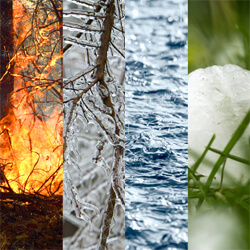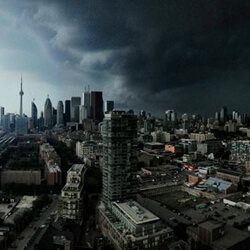
The Fort McMurray wildfires that forced almost 90,000 residents out of their homes earlier this year have been devastating. The damage caused, vast. In fact, the Insurance Bureau of Canada (IBC) estimates that the insured property damage caused by the wildfires to be almost $3.6 billion.
With claims being submitted through home, commercial and auto insurance policies estimated at $3.58 billion, the Alberta wildfire is the costliest insured disaster in Canadian history from the insurance industry's standpoint.
To date, the Alberta wildfires have resulted in about:
- 27,000 personal property claims with the average claim being approximately $81,000.
- 12,000 auto insurance claims, averaging $15,000 per claim.
- 5,000 commercial insurance claims that average over $227,000 per claim.
The most expensive disasters in Canada
Each year, the IBC releases a Facts Book that itemizes the insured losses resulting from disasters that have hit Canada. The following are Canada's most expensive disasters in today's dollars.
- Northern Alberta's wildfires: May, 2016. The cost: $3.58 billion.
The fire, first spotted on May 1, resulted in almost 90,000 people evacuating their homes. It wasn't until June 1, when the first group of residents were allowed to return home. - Eastern Canada's ice storm: January, 1998. The cost: $2.2 billion.
The ice storm, which happened the first week of January, lasted for 80 hours (more than three days) and stretched from Georgian Bay in Ontario all the way over to the Bay of Fundy in New Brunswick. - Southern Alberta's flood: June, 2013. The cost: $1.9 billion.
The floods-a result of long snowy winter, a very wet spring, and a slow moving storm that resulted in up to 18 hours of heavy rain-resulted in 100,000 Alberta residents being told to evacuate their home.  Toronto's flood: July, 2013. The cost: $1 billion.
Toronto's flood: July, 2013. The cost: $1 billion.
Two storm cells converged and hovered over the city, dumping more rain on the city in two hours than it usually sees during the entire month of July.- Slave Lake's wildfire: May, 2011. The cost: $783 million.
100 km/h winds pushed a wildfire so quickly through Slave Lake that at one point, it was moving 70 metres per minute. The wildfires destroyed one-third of the town's homes and businesses. - Southern Ontario's tornadoes and torrential rains: August, 2005. The cost: $740 million.
Dozens of thunderstorms tracked across Southern Ontario, producing golf-ball sized hail, damaging winds, and flash flooding from Kitchener to Oshawa. The system also formed two F2 tornadoes, one near Elmira and other north of Guelph. - Calgary's hailstorm: August, 2012. The cost: $584 million.
In just 10 minutes, hail larger than golf balls battered Calgary on August 12th. Just two days later another fast moving storm hit the city again. This storm however, saw temperatures drop from 23 °C to 11 °C in the span of an hour and produced wind gusts of up to 100 km/h, heavy rain and quarter-sized hail. - Calgary's hailstorm: July, 2010. The cost: $576 million.
Calgary is known as Canada's hailstorm capital, and on July 12th, a fierce 30-minute storm pelted the city with hail balls (some reportedly as big as baseballs). - Calgary's hailstorm: September, 1991. The cost: $542 million.
A 30-minute downpour resulted in 62,000 insurance claims for property damage-mainly broken windows-and another 54,000 claims for vehicle damage.
Natural disasters and your home insurance rates
With the exception of a relatively quiet 2015, the IBC reports that every year since 2009 insured losses from natural disasters have ranged from $1 to $3 billion. If your home insurance rate hasn't already been affected by these past losses, it likely will soon with the increasing frequency of severe weather like floods, wildfires, hail and ice storms. However, because home insurance rates vary considerably from one company to the next, it's important to compare home insurance quotes annually to ensure you have coverage you need at the best available price.
Descriptions of the weather events, mostly adapted from Environment Canada's "Top Ten Weather Stories" archive.




